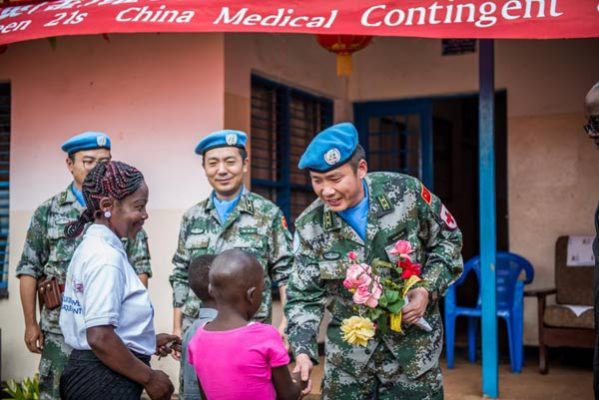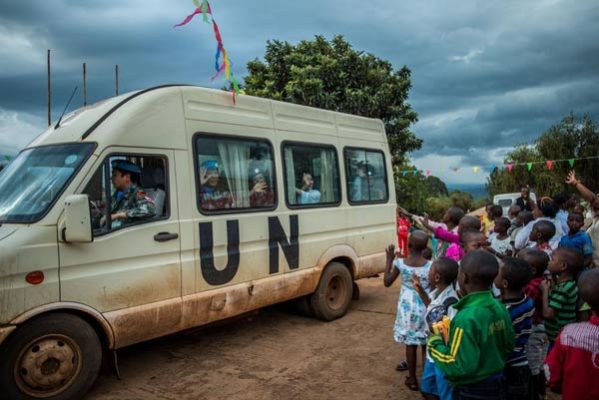
BUKAVU, DR Congo – For the past 12 years, Chinese peacekeepers have been providing assistance to the SOS Children’s Village in the city of Bukavu in eastern Democratic Republic of Congo (DRC).
Over the years, every contingent of the Chinese peacekeepers dispatched to the conflict-torn region would follow a tradition of visiting the village, bringing along aid supplies and providing free medical services.
On a recent drizzly day, a Xinhua reporter followed the peacekeepers of the 21st Chinese peacekeeping mission based in Bukavu, who had arrived there a few months ago, on such a visit.
Eight-year-old Melissa told Xinhua that she and many other children have been living in the village since they were born. After classes, teachers would live together with the children. For them, the village is not only a school, but their home.
Statistics from the UN Children’s Fund (UNICEF) show that among the 1.4 million people displaced in conflicts in the DRC over the past year, more than 850,000 were children.
Bukavu lies on a hillside overlooking Lake Kivu in South Kivu province, which has long been suffering from attacks targeting civilian and security institutions by local and foreign rebel militant groups. Thousands of civilians were killed in the region last year, according to the UN.
The SOS Children’s Village in Bukavu is derived from its predecessor in Austria during the World War II, specializing in taking care of orphans. Founded in 1989, the Bukavu village is one of the earliest charity organizations in the DRC.
Village director Ciranee Cisika said the children are divided into 15 families, each of them with a “Mama” and 10 boys and girls of different ages.
The children are brothers and sisters who are taken care of by their “Mama,” said Cisika.
SOS Children’s Village Bukavu is equipped with facilities like school, medical center and vocational training center that are typical of ordinary family communities, where the children grow up until they become adults, said Cisika.

In its nearly 30 years of operations, the village has been running with difficulties as a charity, she said. Located on a remote hillside, it suffers from a chronic shortage of water and electricity. Moreover, frequent larceny by those displaced in regional conflicts presents an even worse challenge to the community, where there are only a total of three security personnel.
Doctor Zhang Jian, a psychologist of the Chinese peacekeeping mission, offered the children a show of Chinese calligraphy. To his amazement, a boy named Daniel learned to write down a Chinese motto: Study well and make progress every day, on the first attempt.
Yang Xia, an oculist, gave the children an eye examination. At first, they were full of curiosity and meekness, said Yang. But after a while, their faces lit up in a lively and joyous mood, holding my hands tightly, a scene reminding me of my four-year-old son back home.
With help from the SOS Children’s Village and the Chinese peacekeeping mission, the living conditions of the children will be constantly improved, Yang said.
Cisika said that each year, the Chinese peacekeepers would pay more than four times of visits to the village, bringing along supplies and providing regular medical services.
More importantly, the Chinese peacekeepers introduced the children to the world of Chinese culture, broadening their scope of life and bringing about joy and solace, she said.
“Can I have a Chinese national flag?” asked the children as they extended their hands to the Chinese soldiers, who were concluding the visit and leaving.
The children may have yet to grasp what China is really like, but they are already showing signs of attachment to the Chinese peacekeepers, who are among the most familiar people other than their teachers.
With continuous help from the Chinese peacekeeping mission, the medical conditions of the Villages have been improved, said Cisika, adding that it is indeed fortunate for the more than 100 orphans living in the village.


